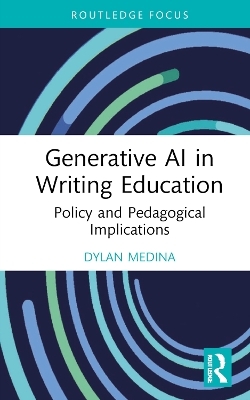
Generative AI in Writing Education
Policy and Pedagogical Implications
Seiten
2024
Routledge (Verlag)
978-1-032-79249-1 (ISBN)
Routledge (Verlag)
978-1-032-79249-1 (ISBN)
Generative AI in Writing Education provides technically sound guidance on how various stakeholders should engage with generative AI and outlines how generative AI can be both a help and hindrance for students, enabling readers to craft informed and meaningful policy and successfully integrate AI in the composition classroom.
This book provides a theoretical framework to allow educators, researchers, and policymakers to better understand computer‑generated writing and the policy and pedagogical implications of generative AI.
Generative AI, such as ChatGPT and Gemini, has substantially disrupted educational spaces, forcing educators, policymakers, and other stakeholders to reconsider writing and how it should be used in education. Responding to this disruption, this book provides technically sound guidance on how various stakeholders should engage with generative AI. After providing a foundational and technical discussion of the technology, this book directly addresses the educational context. Informed by theories of learning and knowledge transfer and utilizing rhetorical theories of writing, this book assesses the impact of AI on student learning, student performance, and academic honesty and integrity. In doing so, the book outlines how generative AI can be both a help and a hindrance for students, enabling readers to craft informed and meaningful policies and successfully integrate AI in the composition classroom.
This book will be of interest to scholars in the fields of Rhetoric and Composition, Technical Writing, Communication Studies, Linguistics, and TESOL, as well as to Education and Machine Learning policymakers, program directors, and researchers.
This book provides a theoretical framework to allow educators, researchers, and policymakers to better understand computer‑generated writing and the policy and pedagogical implications of generative AI.
Generative AI, such as ChatGPT and Gemini, has substantially disrupted educational spaces, forcing educators, policymakers, and other stakeholders to reconsider writing and how it should be used in education. Responding to this disruption, this book provides technically sound guidance on how various stakeholders should engage with generative AI. After providing a foundational and technical discussion of the technology, this book directly addresses the educational context. Informed by theories of learning and knowledge transfer and utilizing rhetorical theories of writing, this book assesses the impact of AI on student learning, student performance, and academic honesty and integrity. In doing so, the book outlines how generative AI can be both a help and a hindrance for students, enabling readers to craft informed and meaningful policies and successfully integrate AI in the composition classroom.
This book will be of interest to scholars in the fields of Rhetoric and Composition, Technical Writing, Communication Studies, Linguistics, and TESOL, as well as to Education and Machine Learning policymakers, program directors, and researchers.
Dylan Medina is an Acting Assistant Professor in the Department of English at the University of Washington, USA. He is also the Director of Software Engineering at gotLearning.
Introduction. Acknowledgments 1. How I Learned to Stop Worrying and Love AI 2. A Background in Computing 3. Computers and Language 4. Writing Theory for Generative AI 5. Risks and Opportunities in Pedagogy and Research. Conclusion. References. Index
| Erscheinungsdatum | 03.10.2024 |
|---|---|
| Reihe/Serie | Routledge Research in Writing Studies |
| Zusatzinfo | 4 Tables, black and white; 5 Line drawings, black and white; 5 Illustrations, black and white |
| Verlagsort | London |
| Sprache | englisch |
| Maße | 138 x 216 mm |
| Gewicht | 360 g |
| Themenwelt | Informatik ► Theorie / Studium ► Künstliche Intelligenz / Robotik |
| Sozialwissenschaften ► Kommunikation / Medien ► Kommunikationswissenschaft | |
| Sozialwissenschaften ► Kommunikation / Medien ► Medienwissenschaft | |
| ISBN-10 | 1-032-79249-3 / 1032792493 |
| ISBN-13 | 978-1-032-79249-1 / 9781032792491 |
| Zustand | Neuware |
| Informationen gemäß Produktsicherheitsverordnung (GPSR) | |
| Haben Sie eine Frage zum Produkt? |
Mehr entdecken
aus dem Bereich
aus dem Bereich
Buch | Softcover (2024)
REDLINE (Verlag)
20,00 €
was sie kann & was uns erwartet
Buch | Softcover (2023)
C.H.Beck (Verlag)
18,00 €


